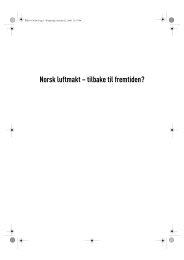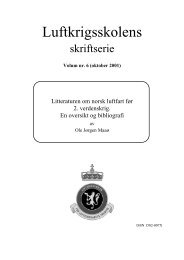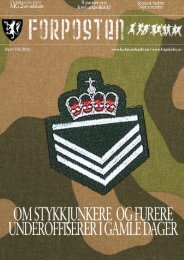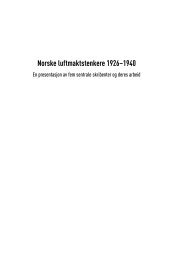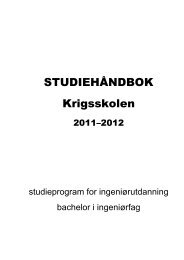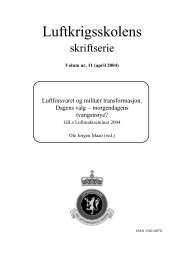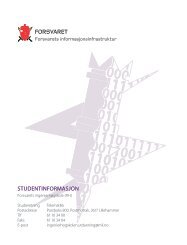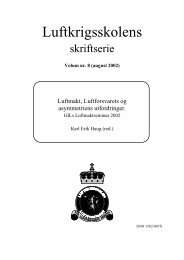Wilhelm Mohr
Wilhelm Mohr
Wilhelm Mohr
You also want an ePaper? Increase the reach of your titles
YUMPU automatically turns print PDFs into web optimized ePapers that Google loves.
PART IV – 9 April – From the Past to the Future<br />
our domestic political debate the war was simply narrowed down to a<br />
power struggle between the Great Powers, which it was better to stay<br />
out of. One did not appear to even glance towards a conclusion either<br />
– as if a winning side with democratic ideals as opposed to a totalitarian<br />
rule was of little significance to us. This may suggest a lack of character<br />
in the matter, or perhaps a kind of cowardice. After all, we knew<br />
England and they knew us, so that was ’tolerable’, but we needed to<br />
be careful with Germany. The political position of neutrality had got<br />
us through last time [i.e. WWI], when we had benefited from indirect<br />
protection. This time, we also had the League of Nations to lean on.<br />
The second issue is of a different character, and is related to the<br />
nature of politics versus what is really in the deeper interests of a society.<br />
Again, it feels strange to observe the political debate and the distinct<br />
lack of understanding of what one was willing to put our young people<br />
through if, despite everything, our society needed to call on them. I<br />
want to emphasize this point, as this is the issue I am least inclined to<br />
forgive our then nation’s political leadership. Other parties must also<br />
shoulder their part of this burden.<br />
When it comes to the war in Norway, I do not share the unconditional<br />
sense of the Government’s greatness that has been expressed<br />
elsewhere. When, early in the morning of 9 April 1940, Foreign Minister<br />
Koht dismissed the German envoy, and the Government did their<br />
part accordingly, a healthy national response was displayed. Unfortunately,<br />
this was not followed up in a manner that our Defence Forces<br />
needed, because is it not the case that the Defence Forces are subservient<br />
to the political will The fact that the people were also forgotten<br />
and Quisling had his chance is a separate matter.<br />
The sinking of Blucher at Oscarsborg [just south of Oslo], which<br />
provided room to manoeuvre, and the efforts of C. J. Hambro, both<br />
ensured the element of choice. The fact that the situation was debated<br />
within the political circles, by then at Hamar, was only natural. This was<br />
the moment when Nygårdsvold realized his perceived reality had been<br />
shattered, felt the gravity of a failed policy, and wished to be relieved<br />
of further governmental duties. It was, however, the Government that<br />
late at night in Elverum recommended that the Parliament conduct<br />
107




